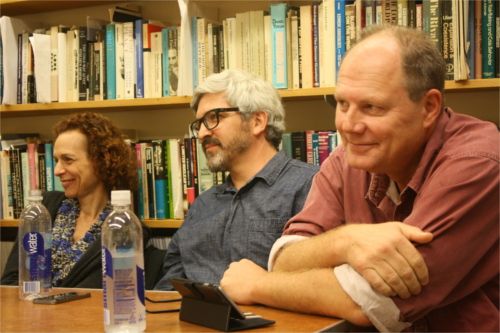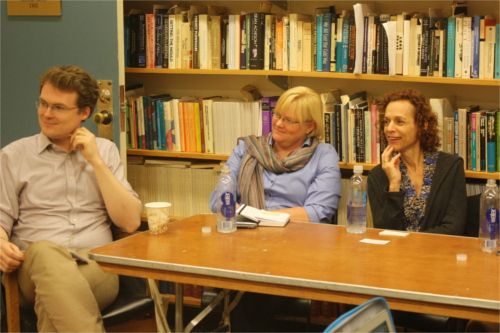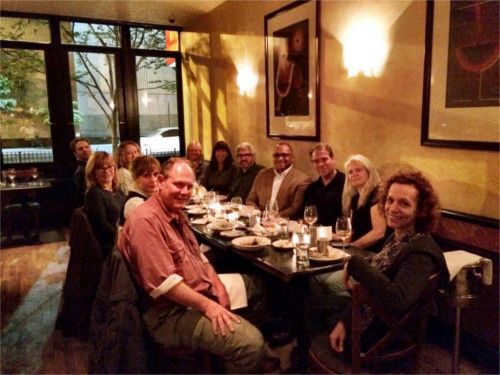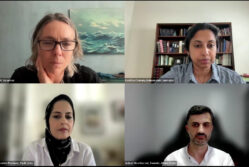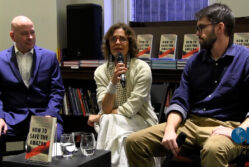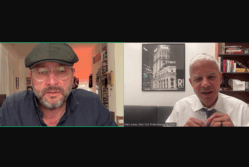
Expert Panel Shares Tips on How to Freelance Safely
As traditional news outlets shrink overseas bureaus, freelance journalists bear more of the burden for foreign reporting, and they’re doing it with less support and fewer resources than their employed counterparts. That puts freelancers at greater risk of injury or kidnapping, and underscores the need for more safety training and more support from strings and press organizations.
On Oct. 21, a panel of experts from organizations dedicated to the welfare of journalists tackled how best to freelance safely for an audience at the Columbia University School of International and Public Affairs.
Judith Matloff, a veteran foreign correspondent who teaches a safety training course at the Columbia University School of Journalism said maintaining a support network of editors and colleagues is critical for staying safe and assessing risk. She said freelancers now face those risks smaller communities without the benefit of formal mentors at big news outlets.
“What I find so frightening about the freelance environment is that people are just totally on their own,” she said. “Freelancers have to accept their own limitations. If you don’t have the money for training, don’t go to a place like Syria. Don’t make that your first assignment.”
She called on news organizations to offer freelancers training and resources to get in and out of hostile environments safely.
OPC member Micah Garen, an independent multimedia journalist and founder of Four Corners Media who has worked in conflict zones around the world, agreed that safe reporting requires a strong support community on the ground and in the newsroom.
“[Freelancers] don’t have a major news organization that’s going to have somebody on payroll who’s doing threat analysis,” he said.
Garen has faced several threats during the course of his work. He was kidnapped in southern Iraq and held for 10 days in 2004 while filming a documentary about the looting of archaeological sites. He was hit by a roadside bomb in Afghanistan in 2009, and later was caught in a massacre in Egypt. He attributes his survival mostly to luck, but said avoiding danger depends heavily on caution and situational awareness.
“The most dangerous times are when you first show up there, and then when you’re too comfortable,” he said.
Sawyer Alberi, lead trainer for Reporters Instructed in Saving Colleagues, or RISC, who served two tours of duty in Iraq as a flight medic and one as a combat medic in Afghanistan, said journalists on any assignment should always prepare for the worst.
“You have to know your medical resources. You have to know where the hospital is, to know what they have and what they don’t have,” she said.
Alberi added that freelancers should not overlook basic travel medicine to cope with other dangers reporting abroad, like car accidents or traveler’s diarrhea.
“The reality is that more people get sick than they do get blown up. That’s statistically just true,” she said.
Echoing the advice of other panelists, she added that colleagues can help to reign in other journalists when risks are too high. “You need to do some gut checks to say if this is a stupid idea or not.”
RISC trains freelance journalists in combat first aid.
Alberi said their course focuses on four key preventable causes of death on the battlefield: bleeding to death, airway management, trauma due to pressure waves from explosives (tension pneumothorax) and hypothermia.
Smith, founder of Frontline Club in London, is one of seven journalists who started a freelancers’ collective called the Frontline Freelance Register, or FFR. The group requires higher training standards among its members, and is seeking better pay for dangerous work, more timely payment and overall better treatment for freelancers.
“But we’re still too often portrayed as lesser journalists by [employed correspondents] when the hand-wringing about journalism safety starts,” he said. “If we want to help freelancers, we must correct negative assumptions about them. In truth, freelance content has become indispensable.”
He said that two-thirds of the group’s 400 members are freelance out of choice, and one-third said they thought their editors don’t care about their safety at all.
The audience included notable voices in the movement to improve safety for journalists overseas.
Charles Sennott, the co-founder of Global Post who was closely involved in the struggle to free James Foley, who was a stringer for the organization. Sennott founded The Ground Truth Project, a nonprofit dedicated to “providing mentoring and training for the next generation of foreign correspondents.”
“This is a time to seize the moment of Jim [Foley]’s death, and Steve Sotloff’s death,” he said. “There’s a point in time here that we need to recognize. It’s a moment upon us to seize all of this energy and really affect change.”
OPC Foundation President Bill Holstein told attending students about the foundation’s 15 scholarships and internships to provide training for college students in the U.S. and Canada who want to become foreign correspondents.
“This year, for the first time, when we fly all the winners to New York, we’re going to provide situational awareness training,” by the Washington, DC-based Global Security firm, Holstein said.
Stay tuned for a video of the entire panel that we’ll post on this site over the next few days.

